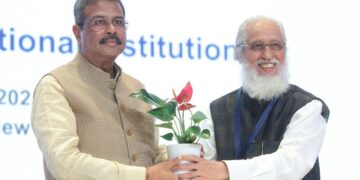By Dr. Prachi Gharpure – Director, SVKM’s NMIMS Indore

Established by the Centre of Testing & Evaluation, the National Testing Service (NTS) is a step towards introducing a centrally-monitored mechanism for quality control. It aims to create benchmarks for academic standards that must be met at every level in educational institutions.
The concept of a centralised and standardised testing body is novel for India. Along with an accreditation process, NTS should further strengthen our higher educational institutions in line with the objective of increasing employability as entailed in the National Educational Policy 2020. But the question arises, with well-established universities and accreditations by national bodies, is there a need for a National Testing Service?
The answer lies in our uneven standards of higher education. The sheer number of colleges without accreditations or those not eligible for accreditations, means that there are too many institutions that are operating outside of any standardised parameters. Many of these colleges have been operating for a fairly long time, and there is no minimum level of assurance in terms of the quality of education. As a result, the graduates of such institutions cannot rely on their degrees alone. Some students may do well by the dint of their personal capability, but the degree, which should be representative of a certain level of competence, holds no such distinction. The majority of the students are, hence, underskilled. With such an exam, institutions will ensure that their students pass that minimum level of eligibility.
A common testing service will require a model curriculum. As this is still in the proposal stage, the details are still to be informed, however, it must be acceptable and operational at a national level. The NTS is unlikely to be on the lines of a common entrance test where thousands of students take an exam on a set date. The expectation is that these tests will be voluntary in nature and that a student can take them whenever required. While it may not be necessary for students of premier institutions, it can help students from lesser-known schools in establishing their skill levels.
It envisages 60 Regional Field Units across 30 regions of the country. To ensure compatibility and standardisation, the NTS will be based on a concept-based continuum of graded syllabi. The tests will also distinguish between aptitude, achievement, and proficiency.
The challenge here will be to maintain the same level of evaluation throughout. Schedulable tests, like GRE, are based on a creditable database of questions and test designs. In other words, a reliable and exemplary test populated by relevant questions. The NTS test must have a similar level of grading and design.
Once established, NTS will help in restructuring certification or qualification tests to ensure a minimum level of eligibility. It can help students to gauge their potential at both national and regional levels and provide employers with a comparable scale. It provides a scientific basis to recognise or grade colleges and universities, and may eventually influence the quantum of financial support they can receive from bodies like the University Grants Commission.
The establishment of the NTS is welcome news and will help in improving the overall quality of higher education, establishing a nationally-recognised benchmark for different skill levels. All colleges and schools must encourage their students to appear for the test in order to ensure wide recognition and a high level of participation.












